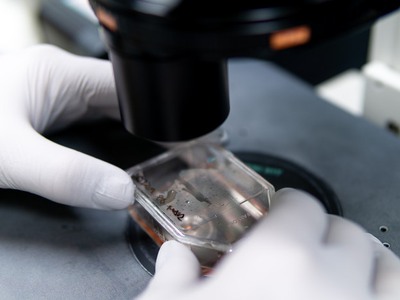New research from the University of Skövde paves the way for faster diagnostics, tailored treatments, and more efficient drug development. An unexpected bonus is that old drugs could find new applications. "AI has revolutionised the field of precision medicine and will improve the quality of life for many," says Zelmina Lubovac, Senior Lecturer at the School of Bioscience.

An exciting discovery in the project is AI’s ability to identify new uses for already approved drugs.
Imagine sitting with your doctor in a consultation room. On the screen, you see the results of an AI analysis. Thanks to innovative AI models, the doctor offers a treatment tailored to your unique genetic profile. No need to try multiple medications to find the right one. This could soon become a reality.
Personalised Treatments
In the AI-Driven Precision Medicine project, led by the University of Skövde, researchers have developed AI models to understand diseases better and create personalised treatments.
"Now we can detect diseases more quickly and develop more precise treatments, improving patient care while reducing the time and costs of drug development," says Zelmina Lubovac, project leader and Senior Lecturer at the School of Bioscience.
For many years, the University of Skövde has focused on creating models based on vast amounts of molecular biology data. These models can now predict biomarkers, supporting the development of more accurate and individualised treatments.

Zelmina Lubovac argues that AI is now revolutionising the field of precision medicine.
Repurposing Drugs for New Applications
Another exciting discovery in the project is AI’s ability to identify new uses for already approved drugs, a field known as "drug repurposing". Researchers used their AI model to identify genes linked to diseases and compared them to genes targeted by drugs listed in a database called DrugBank. This database contains detailed information about drugs and their interactions with the body.
"We’ve been able to suggest relevant drug candidates among approved drugs, opening new opportunities for repurposing. A drug originally approved for one condition could potentially treat another. This approach is faster and more cost-effective than traditional drug development," says Zelmina Lubovac.
AI Trained on Healthy Cells
Rasmus Magnusson, formerly a researcher at the University of Skövde and now at Linköping University, explains that the AI model was trained to recognise what a healthy cell looks like. If trained on images of dogs, the model would learn that all dogs have noses and two ears. Similarly, it learns what a healthy cell should look like.
"Once trained, the model can identify abnormalities in cells, leading to a better understanding of diseases and aiding the development of suitable treatments," says Rasmus Magnusson.
Effective with Small Data Sets
Researchers utilised tens of thousands of samples from public databases to train the AI model. The model now has a robust understanding of healthy cells and can also work effectively with smaller data sets, such as those from disease-specific studies.
"We’ve demonstrated that you no longer need large datasets for a specific disease to use our model. Training it on extensive data from healthy individuals is sufficient. It can still help interpret data from various diseases, which is a major advantage in preclinical studies. Early-stage studies often have small, noisy datasets," explains Rasmus Magnusson.
About the Project
AI-Driven Precision Medicine is part of the larger Biomedical AI-Driven Data Analysis research project, led by researchers at the University of Skövde and funded by the Knowledge Foundation (KK-stiftelsen).
The study Latent space arithmetic on data embeddings from healthy multi-tissue human RNA-seq decodes disease modules was published in the journal Pattern by researchers from the University of Skövde, Linköping University, Stockholm University, the University of Gothenburg, King Abdullah University of Science and Technology, Karolinska Institutet, and Science for Life Laboratory.
What is a Biomarker?
A biomarker is a measurable indicator in the body that can show whether you are healthy or unwell or if a treatment is effective. It could be a specific molecule, a protein, or another signal in blood or bodily fluids that reflects changes in the body. For instance, elevated levels of a biomarker in the blood might indicate a particular condition, such as cancer or an infection. Biomarkers help doctors make accurate diagnoses and select the best treatment for each individual.



